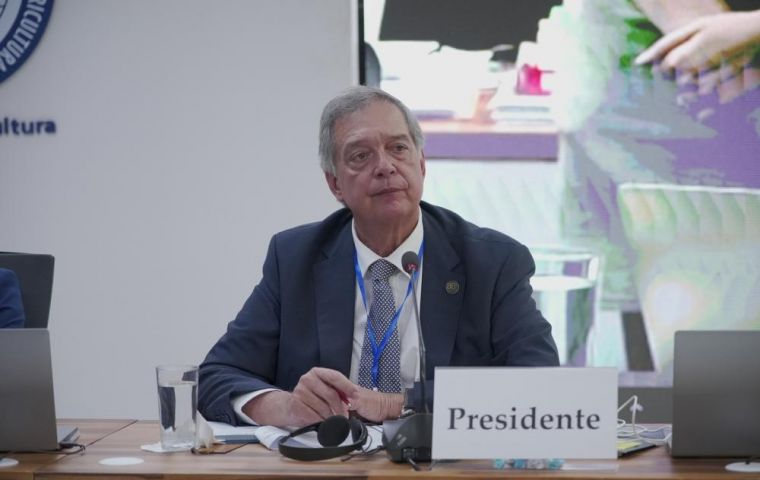MercoPress. South Atlantic News Agency
Uruguayan minister chosen unanimously to head Inter-American Board of Agriculture
 Mattos underscored IICA's support in the coordination of public agricultural policies
Mattos underscored IICA's support in the coordination of public agricultural policies Uruguay's Agriculture and Livestock Minister Fernando Mattos was voted unanimously by all 32 attending delegations to chair the Inter-American Board of Agriculture (IABA) for the period 2023-2025 during a convention held in San José, Costa Rica, it was announced Friday. Mattos' candidacy was put forward by the representatives from Argentina, it was also reported.
With Mattos' appointment, Uruguay will replace Brazil, who held the presidency for the past two years.
“For Uruguay, an agricultural country, in which agricultural production has been one of the main axes of development and growth since the beginning of its history, it is a great honor to chair the IABA again; we had the opportunity to hold this position some years ago when the conference was held in Montevideo in 1985,” Mattos recalled.
He also underscored IICA's cooperation, support, and technological development, as well as its fundamental role in the coordination of public agricultural policies, in order to achieve additional strength in international forums on the environment, trade, best practices, and food security.
Among the various resolutions adopted, it was decided that Brazil will host the next IABA meeting in the second half of 2025. It was also confirmed that the agriculture ministers of the hemisphere will participate in COP 28 in Dubai.
Meanwhile, Inter-American Institute for Cooperation on Agriculture (IICA) Director General Manuel Otero said that he saw potential in the continent to act as a bloc. “The climate I perceived was one of collaboration and cooperation. It was really excellent,” he was quoted by Agencia Brasil as saying.
Over three days in the Costa Rican capital, San José, the conference addressed the sector's main challenges, including issues such as sustainability, food security, climate change, and family farming, Agencia Brasil also reported.
“We're talking about countries, in most cases, with different production realities and experiencing totally different circumstances. But an atmosphere of cooperation has been created, of leaving [aside] the particular issues of each one. There is a conviction that we need to join forces,” said the Argentinean Otero.
“I'm convinced that the future of technical cooperation lies in projects that bring together two or more countries - not necessarily from the same region. They can be very different countries but with complementation in mind,” he added.
Otero believed the future of technical cooperation lay in increasingly multi-stakeholder projects involving governments, the private sector, and civil society organizations. “The boundaries of the themes are also changing. They will no longer just be health or family farming projects. They are projects that cross different themes, strengthening the rural fabric, building bridges with urban centers,” he said. “Agriculture will have an expanded mission, with a clear responsibility for food and environmental balance.”
Regarding the decision to hold the 2025 convention in Brazil, Secretary for Trade and Institutional Relations at the Ministry of Agriculture and Livestock Roberto Perosa pointed out that his country will already be hosting the United Nations Climate Change Conference (COP30) in 2025. For him, the meeting represents the ideal moment for agriculture ministers from the Americas to spend a few more days on Brazilian soil to discuss the sector's main challenges. “It's a unique opportunity,” he said according to Agencia Brasil, referring to the COP as the most important event of recent times.
The Inter-American Board of Agriculture (IABA) was created in 1979 as the highest governing body. The organization was also renamed the Inter-American Institute for Cooperation on Agriculture.




Top Comments
Disclaimer & comment rulesCommenting for this story is now closed.
If you have a Facebook account, become a fan and comment on our Facebook Page!